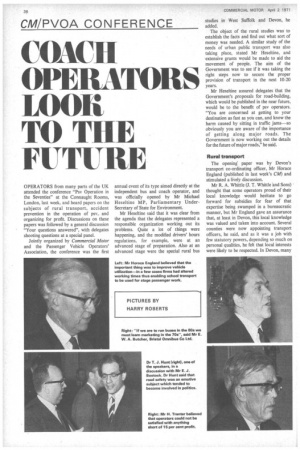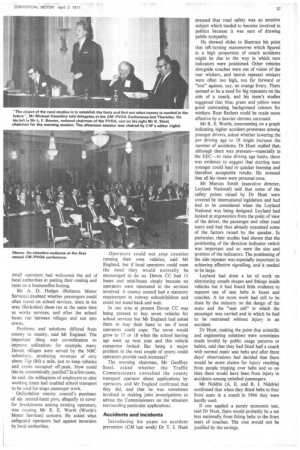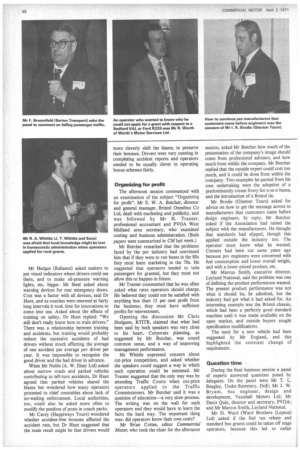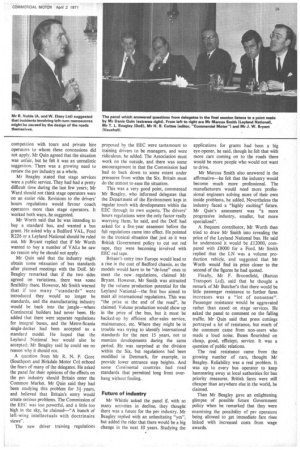COACH OPERATORS LOOK TO THE FUTURE
Page 38

Page 39

Page 40

Page 41

If you've noticed an error in this article please click here to report it so we can fix it.
OPERATORS from many parts of the UK attended the conference "Psv Operation in the Seventies" at the Connaught Rooms, London, last week, and heard papers on the subjects of rural transport, accident prevention in the operation of psv, and organizing for profit. Discussions on these papers was followed by a general discussion "Your questions answered", with delegates shooting questions at a special panel.
Jointly organized by Commercial Motor and the Passenger Vehicle Operators' Association, the conference was the first
annual event of its type aimed directly at the independent bus and coach operator, and was officially opened by Mr Michael Heseltine MP, Parliamentary UnderSecretary of State for Environment.
Mr Heseltine said that it was clear from the agenda that the delegates represented a responsible organization working out its problems. Quite a lot of things were happening, and the modified drivers' hours regulations, for example, were at an advanced stage of preparation. Also at an advanced stage were the special rural bus studies in West Suffolk and Devon, he added.
The object of the rural studies was to establish the facts and find out what sort of money was needed. A similar study of the needs of urban public transport was also taking place, stated Mr Heseltine, and extensive grants would be made to aid the movement of people. The aim of the Government was to see if it was taking the right steps now to secure the proper provision of transport in the next 10-20 years.
Mr Heseltine assured delegates that the Government's proposals for road-building, which would be published in the near future, would be to the benefit of psv operators. "You are concerned at getting to your destination as fast as you can, and know the harm caused by sitting in traffic jams—so obviously you are aware of the importance of getting along major roads. The Government is now working out the details for the future of major roads," he said.
Rural transport
The opening paper was by Devon's transport co-ordinating officer, Mr Horace England (published in last week's CM) and stimulated a lively discussion.
Mr R. A. Whittle (J. T. Whittle 'and Sons) thought that some operators proud of their local knowledge would hesitate to go forward for subsidies for fear of that expertise being swamped in a bureaucratic manner, but Mr England gave an assurance that, at least in Devon, this local knowledge was valued and taken into account. Several counties were now appointing transport officers, he said, and as it was a job with few statutory powers, depending so much on personal qualities, he felt that local interests were likely to be respected. In Devon, many
small operators had welcomed the aid of local authorities in putting their costing and rates on a businesslike footing.
Mr A. D. Hedges (Reliance Motor Services) doubted whether passengers could often travel on school services, since in his area (Berkshire) these ran at the same time as works services, and often the school buses ran between villages and not into towns.
Problems and solutions differed from county to county, said Mr England. The important thing was co-ordination to improve utilization; for example, many Devon villages were served by the NBC subsidiary, producing revenues of only about p (Sd) a mile, just to keep vehicles and crews occupied off-peak. How could this be economically justified? In a few cases, he said, the willingness of employers to alter working times had enabled school transport to be used for stage passenger work.
Oxfordshire county council's purchase of six second-hand psvs, allegedly to cover for breakdowns among existing operators, was causing Mr R. E. Worth (Worth's Motor Services) concern. He asked what safeguard operators had against incursion by local authorities. Operators could not stop counties running their own vehicles, said Mr England, but if local operators could meet the need they would normally be encouraged to •do so. Devon CC had 11 buses and mini-buses simply because no operators were interested in the services involved. A county council had a statutory requirement to convey schoolchildren and could not stand back and wait.
In one area at present Devon CC was being pressed to buy seven vehicles for school services but Mr England had asked them to stay their hand to see if local operators could cope. The seven would grow to 17 or 18 when the school leaving age went up next year and this vehicle expansion looked like being a major problem in the next couple of years; could operators provide such increases?
The morning chairman, Mr Geoffrey Steel, asked whether the Traffic Commissioners consulted the county transport operator about applications by operators, and Mr England confirmed that they did, and that he was sometimes involved in making joint investigations to advise the Commissioners on the situation surrounding particular applications.
Accidents and incidents Introducing his paper on accident prevention (CM last week) Dr T. J. Hunt stressed that road safety was an emotive subject which tended to become involved in politics because it was sure of drawing public sympathy.
He showed slides to illustrate his point that left-turning manoeuvres which figured in a high proportion of coach accidents might be due to the way in which turn indicators were positioned. Other vehicles alongside coaches were out of vision of the rear winkers, and lateral repeater winkers were often too high, too far forward or "lost" against, say, an orange livery. There seemed to be a need for big repeaters on the side of a coach, and his team's studies suggested that blue, green and yellow were good contrasting background colours for winkers. Rear flashers could be made more effective by a heavier chrome surround.
Mr R. E. Worth, commenting on a graph indicating higher accident-proneness among younger drivers, asked whether lowering the psv driving age to 18 might increase the number of accidents. Dr Hunt replied that, although there was pressure—especially in the EEC to raise driving age limits, there was evidence to suggest that starting men younger could lead to quicker learning and therefore acceptable results. He stressed that all his views were personal ones.
Mr Marcus Smith (executive director, Leyland National) said that some of the safety points raised by Dr Hunt were covered by international legislation and had had to be considered when the Leyland National was being designed. Leyland had looked at ergonomics from the point of view of the driver, the passenger and other road users and had thus already examined some of the factors raised by the speaker. In particular, their studies had shown that the positioning of the direction indicator switch was important and so were the size and position of the indicators. The positioning of the side repeater was especially important in achieving effective signalling, and it needed to be large.
Leyland had done a lot of work on eliminating unsafe shapes and fittings inside vehicles but it had found little evidence to support use of seat belts in buses and coaches. A lot more work had still to be done by the industry on the design of the seats and the "seat cell" in which the passenger was carried and in which he had to be restrained without injury in an accident.
Dr Hunt, making the point that scientific and engineering solutions were sometimes made invalid by public usage patterns or habits, said that they had fitted half a coach with normal static seat belts and after three days' observations had decided that there would be more claims for injury resulting from people tripping over belts and so on than there would have been from injury in accidents among unbelted passengers.
Mr Niddrie (A. E. and R. I. Niddrie) confirmed that when they fitted belts to four front seats in a coach in 1966 they were hardly used.
If one applied a purely economic test, said Dr Hunt, there would probably be a net loss nationally from fitting belts to the front seats of coaches. The cost would not be justified by the savings. Mr Hedges (Reliance) asked makers to put visual indicators where drivers could see them, and to make oil-pressure warning lights, etc, bigger. Mr Steel asked about warning devices for rear emergency doors. Cost was a factor with all devices, said Dr Hunt, and as coaches were renewed at fairly long intervals it took time for innovations to come into use. Asked about the effects of training on safety, Dr Hunt replied: "We still don't really know how to train drivers." There was a relationship between training and accidents, but training would probably reduce the excessive accidents of bad drivers without much affecting the average of one accident per average psv driver per year. It was impossible to recognize the good driver and the bad driver in advance.
When Mr Noble (A. W. Elsey Ltd) asked about narrow roads and parked vehicles contributing to left-turn accidents, Dr Hunt agreed that parked vehicles shared the blame but wondered how many operators protested to chief constables about lack of no-waiting enforcement. Local authorities, too, could also be asked more often to modify the position of posts in coach parks.
Mr Carey (Happiways Tours) wondered whether accident-free bonuses affected the accident rate, but Dr Hunt suggested that the main result might be that drivers would more cleverly shift the blame, to preserve their bonuses. Drivers were very cunning in completing accident reports and operators needed to be equally clever in operating bonus schemes fairly.
Organizing for profit The afternoon session commenced with an examination of the subject "Organizing for profit". Mr E. W. A. Butcher, director and general manager, Bristol Omnibus Co Ltd, dealt with marketing and publicity, and was followed by Mr H. Tranter, professional accountant and PVOA West Midland area secretary, who examined costing and business administration. (Both papers were summarized in CM last week.)
Mr Butcher remarked that the problems faced by the psv industry had convinced him that if they were to run buses in the 80s they must learn marketing in the 70s. He suggested that operators tended to take passengers for granted, but they must not allow this to happen in future.
Mr Tranter commented that he was often asked what rates operators should charge. He believed they could not be satisfied with anything less than 15 per cent profit from the business; they must have sufficient profits for reinvestment.
Opening the discussion Mr Chris Hodgson, RTITB, claimed that what had been said by both speakers was very close to his heart. Corporate planning, as suggested by Mr Butcher, was sound common sense, and a way of improving management performance.
Mr Whittle expressed concern about cut-price competition, and asked whether the speakers could suggest a way in which such operation could be stemmed. Mr Tranter suggested that the only way was by attending Traffic Courts when cut-price operators applied to the Traffic Commissioners. Mr Butcher said it was a question of education—a very slow process. The writing was on the wall for such operators and they would have to learn the facts the hard way. The important thing was: did operators know their own costs?
Mr Brian Cottee, editor Commercial Motor, who took the chair for the afternoon
session, asked Mr Butcher how much of the presentation of the company's image should come from professional advisers, and how much from within the company. Mr Butcher replied that the outside expert could cost too much, and it could be done from within the company. Two examples he quoted from his own undertaking were the adoption of a predominantly cream livery for o-m-o buses, and the introduction of a Bristol tie.
Mr Brodie (Glenton Tours) asked for advice on how to get the message across to manufacturers that customers came before design engineers. In reply, Mr Butcher asked if the Association had raised the subject with the manufacturers. He thought that standards had slipped, though this applied outside the industry too. The operator must know what he wanted. Corners had been cut some years ago because psv engineers were concerned with fuel consumption and lower overall weight, and with a lower-priced product, etc.
Mr Marcus Smith, executive director, Leyland National, said the problem was one of defining the product performance wanted. The present product performance was not what it should be, he admitted, but the industry had got what it had asked for. An interesting example was the Bristol chassis, which had been a perfectly good standard machine until it was made available on the open market, and outside buyers sought specification modifications.
The need for a new vehicle had been suggested by Mr England, and this highlighted the constant change of requirement.
Question time During the final business session a panel of experts answered questions posed by delegates. On the panel were Mr T. L. Beagley, Under-Secretary, DoE; Mr J. W. Bryant, bus engineer, design and development, Vauxhall Motors Ltd; Mr Denis Quin, director and secretary, PVOA; and Mr Marcus Smith, Leyland National.
Mr D. Ward (Ward Brothers (Lepton) Ltd) asked if the fuel tax rebate and standard bus grants could be taken off stage operators, because this led to unfair
competition with tours and private hire operators to whom these concessions did not apply. Mr Quin agreed that the situation was unfair, but he felt it was an unrealistic suggestion. There was a growing need to review the psv industry as a whole.
Mr Beagley stated that stage services were a public service. They had had a pretty difficult time during the last few years; Mr Ward should not think stage operators were on an easier ride. Revisions to the drivers' hours regulations would favour coach operators more than stage operators. It worked both ways, he suggested.
Mr Worth said that he was intending to buy a standard bus, and wanted a bus grant. He asked why a Bedford VAL, Ford R226 or a Leyland National should be ruled out. Mr Bryant replied that if Mr Worth wanted to buy a number of VALs he saw no reason why he should not apply.
Mr Quin said that the industry might obtain some relaxation of bus standards after planned meetings with the DoE. Mr Beagley remarked that if the two sides agreed on variations, there was some flexibility there. However, Mr Smith warned that if too many "standards" were introduced they would no longer be standards, and the manufacturing industry would be back into the jungle—where Continental builders had never been. He added that there were separate regulations for integral buses, and the Metro-Scania single-decker had been accepted as a standard model. He hoped that the Leyland National bus would also be accepted; Mr Beagley said he could see no reason why it should not.
A question from Mr R. N. P. Gore (Southport and Birkdale Motor Co) echoed the fears of many of the delegates. He asked the panel for their opinions of the effects on the psv industry should Britain enter the Common Market. Mr Quin said they had been studying this problem for 3+ years, and believed that Britain's entry would create serious problems. The Commission of the EEC was too powerful, and a little too high in the sky, he claimed—"A bunch of left-wing intellectuals with doctrinaire views".
The new driver training regulations proposed by the EEC were tantamount to training drivers to be managers, and were ridiculous, he added. The Association must work on the outside, and there was some encouragement in that the Commission had had to back down to some extent under pressures from within the Six. Britain must do the utmost to ease the situation.
This was a very good point, commented Mr Beagley, who informed delegates that the Department of the Environment kept in regular touch with developments within the EEC through its own experts. The drivers' hours regulations were the only factor really worrying them, he said, and the DoE had asked for a five-year easement before the full regulations came into effect. He pointed to the ironical situation that just as it was British Government policy to cut out red tape, they were becoming involved with EEC red tape.
Britain's entry into Europe would lead to a rise in the cost of Bedford chassis, as the models would have to be "de-luxe" ones to meet the new regulations, claimed Mr Bryant. However, Mr Smith was attracted by the volume production potential for the Leyland National—the first bus aimed to meet all international regulations. This was "the prize at the end of the road", he claimed. Volume production would show up in the price of the bus, but it must be backed-up by efficient after-sales service, maintenance. etc. Where they might be in trouble was trying to identify international standards for the next 15 years, not to mention developments during the same period. He was surprised at the division within the Six, but regulations had been modified in Denmark, for example, to provide lower entrance step heights. And some Continental countries had road standards that permitted long front overhang without fouling.
Future of industry
Mr Whittle asked the panel if, with so many activities in decline, they thought there was a future for the psv industry. Mr Beagley replied with an unhesitating "yes", but added the rider that there would be a big change in the next 10 years. Studying the applications for grants had been a big eye-opener, he said, though he felt that with more cars coming on to the roads there would be more people who would not want to drive.
Mr Marcus Smith also answered in the affirmative—he felt that the industry would become much more professional. The manufacturers would need more professional engineers solving more of their own inside problems, he added. Nevertheless the industry faced a "highly exciting" future. Mr Quin's assessment was "a more progressive industry, smaller, but more specialized".
A frequent contributor, Mr Worth then tried to draw Mr Smith into revealing the price of the Leyland National bus. He said he understood it would be £12000, compared with £.8000 for a Ford. Mr Smith replied that the LN was a volume production vehicle, and suggested that Mr Worth would find its price closer to the second of the figures he had quoted.
Finally, Mr F. Broomfield, (Barton Transport Ltd), said that he thought a remark of Mr Butcher's that there would be little passenger resistance to further fares increases was a "lot of nonsense". Passenger resistance would be aggravated rather than eased on stage services. He asked the panel to comment on the falling traffic. Mr Quin said that press cuttings portrayed a lot of resistance, but much of the comment came from non-users who made a loud noise. Buses flourished on cheap, good, efficient, service. It was a question of public relations.
The real resistance came from the growing number of cars, thought Mr Beagley. Reliability was a real problem. It was up to every bus operator to keep hammering away at local authorities for bus priority measures, British fares were still cheaper than anywhere else in the world, he claimed.
Then Mr Beagley gave an enlightening glimpse of possible future Government policy when he remarked that they were examining the possibility of psv operators being allowed to get immediate fare rises linked with increased costs from wage awards.




























































































